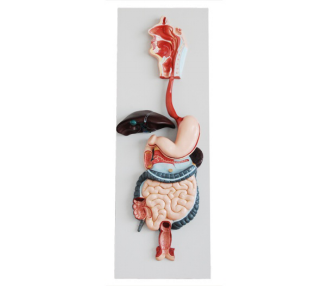First, the digestive system model provides a safe, risk-free practice environment. In a real-world medical setting, examining and manipulating the digestive system often involves complex anatomy and fine manipulation skills, which can be a huge challenge for medical novices. The digestive system model allows the novice to practice repeatedly without any risk, so as to gradually become familiar with and master the relevant operational skills.

Secondly, the digestive system model has a high degree of authenticity and simulation effect. These models are usually designed and manufactured according to the anatomical structure and functional characteristics of the real human body, and are able to simulate various physiological and pathological states of the digestive system. By manipulating these models, medical novices can gain a deeper understanding of the structure and function of the digestive system and the impact of different diseases on the digestive system. This intuitive and lively way of learning helps to deepen the novice's understanding and memory of the digestive system.
In addition, the digestive system model is also reusable. Compared to real medical operations, using models for practice does not require expensive medical resources and is not limited by time and place. This means that medical novices can practice anytime, anywhere, and constantly consolidate and improve their operational skills. This flexibility allows beginners to quickly improve their practical skills in a short period of time.
Finally, the digestive system model can also facilitate the close integration of medical education and clinical practice. By using the digestive system model for practical training, medical novices can better apply the theoretical knowledge they have learned to practical operation and improve their clinical practice ability. At the same time, by simulating real medical scenarios and patient situations, novices can also learn how to deal with various complex problems and challenges in practice, and improve their resilience and comprehensive quality.
To sum up, the digestive system model has a significant role in improving the practical skills of medical novices. By providing a safe, authentic, reusable practice environment and promoting the close integration of medical education and clinical practice, the digestive system model provides a valuable learning and growth platform for medical novices.
